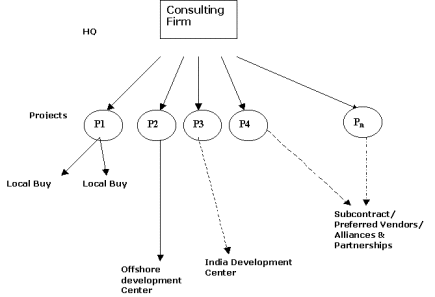|
Previous
Part - VII
As can be seen from the figure, since the markets are characterized by growth and stagnation, hence the consultancy firms and IT companies normally keep some ERP resources on their payrolls while they prefer to outsource the rest as and when requirements exist. The firms normally plan their resources for the slump so that they can carry out their projects during slump periods with their own resources and without having to bench them. As a rough-cut estimate, a big firm would outsource three SAP consultants for every SAP consultant that it might have. Hence opportunities for alliances and partnerships exist in this space.

As shown in the figure on the previous page, suppose a big IT firm is headquartered at New York. It will have several ERP projects for different clients spread across several locations, say in Boston, Paris, London, Tokyo etc.. A Project Manager who will be responsible for the project will head the projects. Now because of certain project requirements, a project manager could require ERP resources to carry out certain projects. Because of the reasons mentioned earlier, the consulting firm might not have that many resources at its payroll. Hence the project manager might look for resources outside.
Several of the big consulting firms now already have offshore development centers in India or are in the process of setting them up. Hence in case of a resource crunch, they look to these offshore development centers for their resources. In case a firm cannot meet the requirements through an offshore initiative of its own, then it might look for other avenues for getting the resources. Several firms have a preferred list of vendors. Whenever they have requirements, they pull resources from those vendors. Some firms might also go for a local buy that is exploring the local markets wherever the projects are carried out to find resources. This is often referred to as 'local buy'. The Indian firms thus can either try to get into the preferred vendor lists of these clients, or can set up offices in important software cities of the world, so that they can increase their business through the 'local buy' route.
Conclusion
In the current situation, majority of the HRIS projects that the Indian companies carry out, are in the implementation and post- implementation stages. However, big money lies in the pre- implementation stage. The Indian companies must gear up to tap business opportunities in this stage. For this they must be prepared to hire quality consultants and aggressively sell their expertise in high level consulting. The have to move up the value chain from providing only implementation and low- level consulting services to world-class consulting. By matching their excellent brand equity at delivering software services with high level consulting, they can project themselves as complete solutions providers and take on the might of companies like IBM, EDS, CGEY and the likes.
Concluded.
* Contributed by -
Rupam Das,
The Media Cell.
XIM Bhubaneswar.
|
 |
 |
|